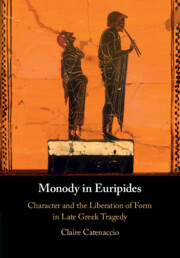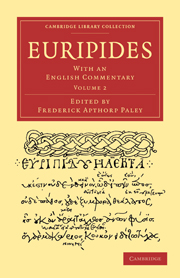Monody in Euripides
The solo singer takes center stage in Euripides' late tragedies. Solo song – what the Ancient Greeks called monody – is a true dramatic innovation, combining and transcending the traditional poetic forms of Greek tragedy. At the same time, Euripides uses solo song to explore the realm of the interior and the personal in an expanded expressive range. Contributing to the current scholarly debate on music, emotion, and characterization in Greek drama, this book presents a new vision for the role of monody in the musical design of Ion, Iphigenia among the Taurians, Phoenician Women, and Orestes. Drawing on her practical experience in the theater, Catenaccio establishes the central importance of monody in Euripides' art.
- Establishes the central importance of monody (solo actor's song) in Ancient Greek drama
- Situates monody within the context of theatrical and musical innovation in Athens in the late fifth century BCE
- Presents a new theory of solo song in Greek drama as a vehicle to express varied emotions, including grief, anger, fear, surprise, and joy
Reviews & endorsements
‘… a stimulating study of the style and dramatic impact of these innovative late Euripidean monodies.’ Martin Cropp, Bryn Mawr Classical Review
Product details
August 2023Adobe eBook Reader
9781009300155
0 pages
This ISBN is for an eBook version which is distributed on our behalf by a third party.
Table of Contents
- Introduction: the song at work
- 1. Ion: Monody as Agōn
- 2. Iphigenia among the Taurians: memory and movement
- 3. Phoenician women: the lyric voice of a shattered house
- 4. Orestes: monody as messenger speech
- Conclusion: freedom and form.






